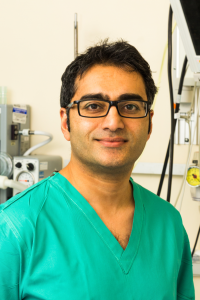When did you decide to focus on colorectal surgery and why do you choose this as a specialism?
It was early in my career that I decided to choose colorectal surgery. For some reason I felt I understood it instinctively, it just felt right. While I enjoyed most types of surgery, I knew very early on that colorectal surgery was the specialism for me, the area of medicine I felt the most excited and passionate about. I retain the same enthusiasm for my discipline all these years later!
When did you first become involved with BRUK?
I was working in Professor Williams’s unit at The London Hospital in Whitechapel and saw that many of the research projects were funded by the charity. Later, I was asked to get involved with a number of medical research charities who needed help evaluating a steady stream of applications for grants and bursaries for pioneering research into all kinds of bowel disorders. I was very happy to offer my help because charities are an important source of funding in my field and I still assess applications for charity funding when my diary allows, which isn’t as often as I would like.
What’s your view on the advances in medical treatments for inflammatory bowel diseases (IBDs)? Have we come far enough, quickly enough?
The short answer is no. This is the crux of the matter. There is so much more to learn about these medical conditions and effective therapies will only be possible once we understand them fully.
For example, we don’t really know what causes Crohn’s Disease or Ulcerative Colitis, or indeed understand many aspects of normal gut function. Unfortunately, money in medical research tends to be easier to raise in areas that give the most immediate returns on investment, so IBDs haven’t had as much of the funding they need.
We are beginning to realise that solutions to gut diseases are likely to be multi-system, solutions that look at the brain and the biome as well as the bowels themselves. To be able to handle such complex whole-body approaches we will need a lot more investment in areas like artificial intelligence (AI) in medicine. This is clearly the way the future is going.
I am an optimist and believe that by the end of my surgical career there will have been some huge advances made possible by AI. By gathering massive amounts of data and analysing it through the collective efforts of the medical research community, we’ll be able to make great leaps forward in my working lifetime. I can see AI leading to much earlier diagnoses of IBDs which in itself will prevent some people ever needing colorectal surgery. We are not very close to that scenario yet.
What’s it like working in the modern era when patients share their views of consultants via social media?
This is an interesting question. It is certainly a factor these days, and in many ways social media is a very good mechanism for hearing patients’ views and widening the discussion about bowel health and medicine. I think a lot depends on which specialisms one is involved with. If you are a cancer colorectal surgeon and you’ve been able to cure a patient, naturally you tend to get very positive comments on social media.
But in functional medicine working in areas that are poorly understood and under-researched, it’s quite easy to be on the wrong end of some patient groups and receive negative feedback, and of course it’s the loudest voices that get heard the most which are not always representative of most patients’ experience or views. Whatever the effect of social media, it’s vital to not allow bad comments on social media change one’s approach to the work, which is to do the very best for each and every patient.
What’s the longest time you’ve been on your feet during an operation?
It’s not uncommon for certain complex colorectal operations to last up to 12 to 14 hours. While my personal recovery from performing these lengthy procedures inevitably takes more time as I get older, I find that adrenaline and focus gets you through.
What’s actually more exhausting is the shorter stints when you might be on call for much of the day after starting work at 8am, seeing patients, having team meetings, reviewing operating lists and suddenly it’s late in the evening before my team is actually able to get down to surgery.
Working with junior colleagues I accept that part of doing the job properly is they need to ask me questions and involve me in their decision making. But I find the constant juggling of priorities and dealing with crises does take more of a toll on your mind and body as you approach the end of a surgical career.
What do you like most about your job?
The patients. This is a great job. When I am is able to diagnose a patient and work with them and my team to find a cure or an effective treatment, it’s wonderful. There’s simply nothing else like it.
What would you change about your job?
We need clinicians and patients’ voices to be better heard, and for this to not be politicised or seen as contentious. Ultimately, it’s an open secret that there are resource issues in the NHS and I believe that these only be solved with more funding. It’s not a management efficiency issue; it really is a case of more funding being needed necessary to create a better health service, but it’s a legitimate area of national debate how this is actually achieved.

